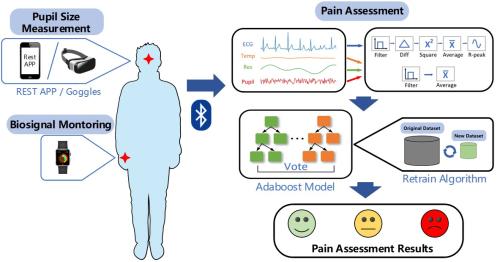UC Davis ASEEC Lab and Johns Hopkins Pain Treatment Center Collaboration Wins Best Presentation Award at 2022 IMIP Conference
Quick Summary
- The best Presentation Award of the 2022 International Conference on Intelligent Medicine and Image Processing (IMIP) conference was awarded to Ruijie Fang from professor Homayoun ASEEC lab to propose a novel congeneric clustering-based machine learning me
- The proposed method compensates for the gap between experimental pain assessment and clinical settings pain assessment by introducing a new dataset MIMIC-III to the field.
Researchers from UC Davis Professor Houman Homayoun's Accelerated, Secure, and Energy-Efficient Computing Lab (ASEEC) Lab and Johns Hopkins University received the Best Oral Presentation Award at the 4th International Conference on Intelligent Medicine and Image Processing (IMIP). The researchers proposed a novel congeneric clustering-based machine learning method for intensive care unit patients’ automatic pain assessment.
Assessing Pain Through Novel Machine Learning
More than 1 in 5 adults (50.2 million people) are suffering from pain on most days or every day, leading to a total loss of productivity of $296 million annually. Pain level assessment is the key to optimal pain treatment. Suboptimal pain management may lead to mental and physical comorbidities, economic losses, and low quality of life. Various datasets have been collected for automatic pain assessment research to have a robust, objective pain assessment method. However, all public datasets are from healthy volunteers by applying experimental pain, e.g., thermal pain. The effectiveness of such assessment methods has not been validated on clinical patient data. To compensate for the gap, the group introduced a new dataset MIMIC-III whose data comes from ICU patients. It proposed a novel method for assessing the pain level on MIMIC-III.

The proposed method contains two stages: pilot study and group study. In a pilot study, modality and features are comprehensively selected to be used in the group study stage. Then, subjects are clustered into eleven groups based on their ICD-9 code as we assume patients with similar diseases will have similar pain responses, so-called “congeneric.” Adaboost models were trained within each group, and the results showed that the proposed congeneric method overperformed traditional machine learning methods.
Accepted Publication by IMIP
This paper titled “Pain Level Modeling of Intensive Care Unit patients with Machine Learning Methods: An Effective Congeneric Clustering-based Approach” has been accepted for publication by the International Conference on Intelligent Medicine and Image Processing (IMIP) 2022. The primary authors are from the ASEEC Lab led by Professor Houman Homayoun at the Department of Electrical and Computer Engineering, UC Davis. Two co-authors are medical doctors from Johns Hopkins University.
About the IMIP Conference
IMIP is an annually-held conference that aims to provide a communication platform for top technology leaders, scholars, engineers, scientists, leading industry leaders as well as graduate students to share ideas and discuss the latest technology in Intelligent Medicine and Image Processing or related fields.

